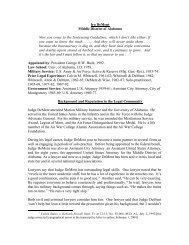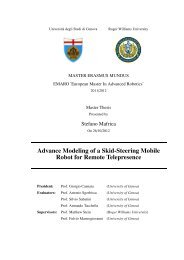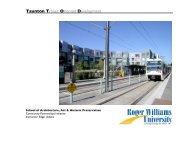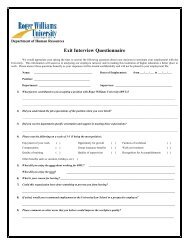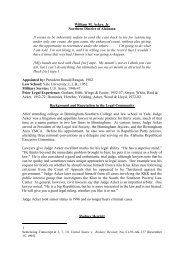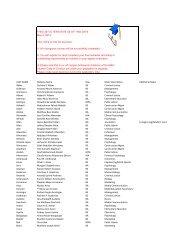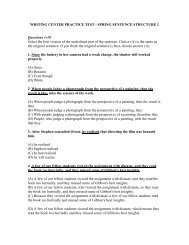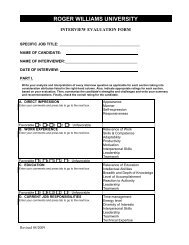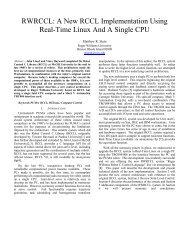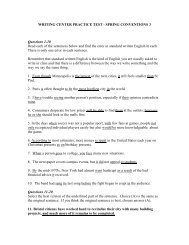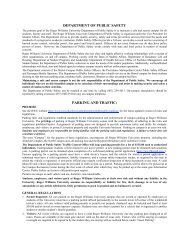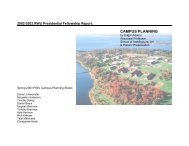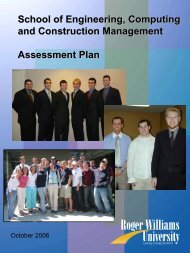Introduction to Academic Writing Common Course Syllabus
Introduction to Academic Writing Common Course Syllabus
Introduction to Academic Writing Common Course Syllabus
- No tags were found...
You also want an ePaper? Increase the reach of your titles
YUMPU automatically turns print PDFs into web optimized ePapers that Google loves.
WTNG 100 Fall 2013<strong>Introduction</strong> <strong>to</strong> <strong>Academic</strong> <strong>Writing</strong><strong>Course</strong> DescriptionFocusing on the connection between reading and writing, this first-year course emphasizes thedevelopment of academic arguments. In a series of increasingly complex assignments, studentscultivate rhe<strong>to</strong>rical and writing process knowledge as well as an understanding of the generalexpectations of the academic discourse community. Assignments focus on summary andanalysis of academically oriented texts. Students must write a series of compositions, submit asatisfac<strong>to</strong>ry portfolio, and earn a C- or higher in the course <strong>to</strong> enroll in WTNG 102. Placemen<strong>to</strong>ccurs in two parts: preliminarily by SAT CR and <strong>Writing</strong> scores, and secondarily by an in-classDiagnostic <strong>Writing</strong> Sample during the first week of class <strong>to</strong> confirm that placement isappropriate. (Lecture, 3 credits.)<strong>Course</strong> ObjectivesBy the end of the course, the successful student will have developed competencies in the areasthat follow.Content Knowledge Define rhe<strong>to</strong>rical situation, genre, summary, paraphrase, analysis, audience, purpose,thesis statement, <strong>to</strong>pic sentence, unity, and coherence<strong>Writing</strong> Process Knowledge Use practices many writers employ <strong>to</strong> write summary and analysis Use the generative power of writing <strong>to</strong> increase comprehension and develop ideas Use instruc<strong>to</strong>r and peer-review feedback <strong>to</strong> improve written workRhe<strong>to</strong>rical Knowledge Apply rhe<strong>to</strong>rical concepts of audience and purpose <strong>to</strong> writing and reading situationsGenre Knowledge Work with genre conventions <strong>to</strong> write summaries and textual/ rhe<strong>to</strong>rical analyses Connect thesis statements and <strong>to</strong>pic sentences <strong>to</strong> unified, coherent, and well-developedparagraphs and papers Identify and use appropriate types of supportDiscourse Community Knowledge Understand and work within general expectations of the academic discoursecommunity. These include valuing disciplined, open-minded inquiry, employing reasonsand evidence, and producing clear, reader-centered prose.Meta-cognition Practice ongoing self-assessment of writing processes and products.
Required TextsBean, John C., Virginia A. Chappell, and Alice M. Gillam. Reading Rhe<strong>to</strong>rically.4 th ed.Additional ResourcesThough you are ultimately responsible for your success in this class, several resources areavailable <strong>to</strong> help. Your instruc<strong>to</strong>r, for example, will hold regular office hours during which he orshe can answer questions and offer feedback on work-in-progress. In addition, RWU has a<strong>Writing</strong> Center, which is located on the 2 nd floor of the Main University Library, in the Center for<strong>Academic</strong> Development. At any point in the writing process, students may work with peerand/or faculty tu<strong>to</strong>rs on an assignment for this or any other class. Additional information, aswell as tu<strong>to</strong>r schedules, can be found at http://www.rwu.edu/go/tss. Purdue University’sOnline <strong>Writing</strong> Lab also provides a wealth of information and helpful links. It can be found athttp://owl.english.purdue.edu.Grading<strong>Course</strong> papers will count for 60% of the course grade, the course portfolio will count for 25%,and class participation will count for 15%.The passing grade for this course is C- (70).If a student does not complete or hand in a paper, the student will receive no credit for thepaper. No D range grade will be assigned as a midterm-warning or final grade.Late Papers and Portfolios<strong>Course</strong> papers will only be accepted if students have completed all parts of the assignment.Late drafts may be accepted but with penalty.Portfolios will not be accepted if students have not completed the coursework. Late portfolioswill also not be accepted, except under extraordinary circumstances. Students who submit anincomplete portfolio or who do not submit a portfolio will fail the course.AttendanceStudents in writing courses are participants in all class activities; they write, discuss writing andreadings, share drafts, and give and get feedback on writing. Thus attendance is expected.Absences in excess of three classes for students in sections meeting three times per week andtwo for students in classes meeting twice a week will negatively affect a student’s participationgrade as well as the student’s semester average.Extenuating circumstances, though, may prevent a student from attending class. A studentshould report extended absences due <strong>to</strong> long-term illness, hospitalization, or bereavement <strong>to</strong>the Student Affairs Office, which will notify the student’s instruc<strong>to</strong>rs and advisor.
The policy regarding make-ups on in-class work and the impact of absenteeism on the student’sgrade will be determined by the section instruc<strong>to</strong>r.Attendance at co-curricular activities may also be required.ParticipationA student’s participation grade is determined by a number of fac<strong>to</strong>rs, including the student’slevel of preparedness for class, engagement in class discussion, performance on in-classindividual and group exercises, as well as the quality of the peer review the student conducts.All of these activities are contingent upon attendance. Students who do not show up for class orshow up late, who are not prepared, or who do not attend <strong>to</strong> the day’s tasks will earn lowerthan a “C.”<strong>Academic</strong> IntegrityAccording <strong>to</strong> the Roger Williams University Catalog,Plagiarism is best defined as the incorporation of words and ideas of anotherperson in an attempt <strong>to</strong> claim that person’s work as one’s own. Thus, plagiarismfails <strong>to</strong> engage in civil, scholarly discourse. It is sometimes a form of intellectualtheft and is always a form of intellectual fraud.In its worst form, plagiarism may consist of directly copying large orsmall portions of either printed or online works, or, as frequently happens inschools, written papers of another student, without properly crediting thesource(s) from which they came. There are, however, more subtle forms ofplagiarism as well. Paraphrasing, which is the process of using alternativeexpressions <strong>to</strong> communicate the meaning of another author’s words, is also aform of plagiarism, unless the sources of those ideas are acknowledged.An in-depth explanation of academic integrity and plagiarism, including the procedures foraddressing possible violations and the penalties for actual violations, can be found on pages 65<strong>to</strong> 67 of the current catalog.In addition, students agree that by taking this course all required papers may be subject <strong>to</strong>submission for textual similarity review <strong>to</strong> Turnitin.com for the detection of plagiarism. Allsubmitted papers will be included as source documents in the Turnitin.com reference databasesolely for the purpose of detecting plagiarism of such papers. Use of the Turnitin.com service issubject <strong>to</strong> the Terms and Conditions of Use posted on the Turnitin.com site.Student Accessibility ServicesStudents who wish <strong>to</strong> receive academic accommodations for this course must first register withStudent Accessibility Services (SAS) in order <strong>to</strong> begin the accommodation process. The SASoffice will provide registered students with the specific information they will need <strong>to</strong> share witheach instruc<strong>to</strong>r. SAS is located on the second floor of the Main University Library and is openfrom 8:00 am <strong>to</strong> 5:00 pm Monday through Friday.Additional information is at http://rwu.edu/academics/academic-services/sas/current-students
<strong>Writing</strong> AssessmentCommitted <strong>to</strong> reflective practice, the Department of <strong>Writing</strong> Studies, Rhe<strong>to</strong>ric, and Compositionconducts ongoing program assessment. Your portfolio or papers may be used (anonymously) forthis purpose unless you notify your instruc<strong>to</strong>r in writing.



